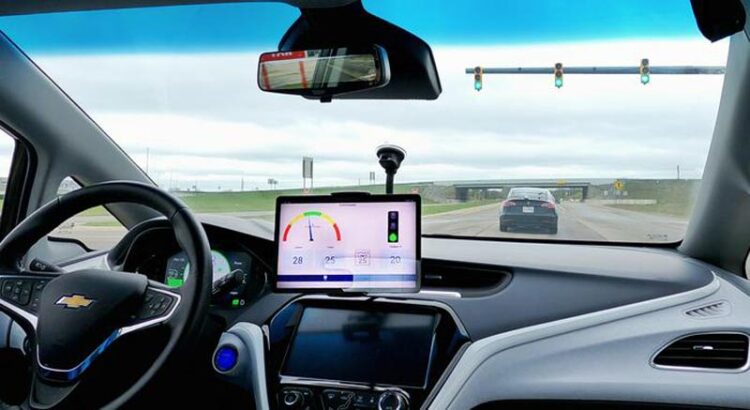Efficiency impact of smart-technology-enabled vehicles

A Southwest Research Institute project funded by the U.S. Department of Energy (DOE) has demonstrated overall energy savings of 15% when vehicles outfitted with connected and automated vehicle systems, or CAVs, are introduced into traffic.
Credit: Southwest Research Institute
Eco-driving technology can significantly improve the energy efficiency of both electric, internal combustion vehicles.
A Southwest Research Institute project funded by the U.S. Department of Energy (DOE) has demonstrated an average of 15% energy savings when vehicles outfitted with connected and automated vehicle systems, or CAVs, are introduced into traffic.
CAVs use wireless smart technology to communicate with other CAVs and traffic infrastructure. SwRI’s eco-driving framework uses custom software and predictive powertrain algorithms to enable human drivers to make more efficient driving decisions using vehicle-to-vehicle (V2V), vehicle-to-infrastructure (V2I) and vehicle-to-everything (V2X) connectivity and communications.
SwRI received a $3.2 million award from the DOE’s Energy Efficient Mobility Systems (EEMS) initiative to study the energy impact of potential smart infrastructure solutions on overall traffic. The project used real-life traffic data, specialized testing equipment and computer modeling to quantify the benefits of incorporating SwRI’s eco-driving framework into different types of vehicles, studying how those vehicles affected traffic flow.
“Understanding how introducing connected and automated vehicles can improve the efficiency of roadways is a growing interest to government and industry alike, especially if they can help reduce energy and emissions output,” said Stas Gankov, a senior research engineer in SwRI’s Powertrain Engineering Division. “We wanted to find the right technology approach to produce at least a 15% savings in energy consumption without negatively impacting traffic flow and trip time. The average savings are propagated to both connected and non-connected vehicles.”
The Institute has spent many years developing cutting-edge CAV technologies to help passenger vehicles operate more efficiently while reducing energy consumption and carbon emissions. The SwRI-developed predictive eco-driving algorithm uses information from neighboring vehicles to minimize accelerations. SwRI’s power-split optimization application uses knowledge of routes and speeds to optimize battery and engine operations to meet power demands more efficiently.
The SwRI team evaluated the average energy consumption of several passenger vehicles from different manufacturers. The vehicles had varying levels of automation and connectivity with powertrains ranging from traditional combustion engines to fully electric. The researchers evaluated the overall traffic energy efficiency of eco-driving-enabled vehicles with dynamometer testing, automated vehicles driving on a test track and computer models that simulated the different traffic corridors.
“We discovered that as eco-driving-enabled vehicles more efficiently drove, using less fuel and overall operating more efficiently, the other vehicles around them adapt and consume less energy, too,” said Gankov. “As we introduce more CAVs into traffic, we see that the roadway efficiency improves enough to, under the right conditions, reduce overall energy consumption by 15% without affecting trip time and traffic flow. Traffic does not slow but flows in a more optimized manner.”
The EEMS project built on SwRI’s Phase I contributions to DOE’s ARPA-E NEXTCAR (NEXT-Generation Energy Technologies for Connected and Automated On-Road Vehicles) Program, which demonstrated up to 20% energy savings in a test car by combining vehicle connectivity technology with simple automated powertrain control algorithms. SwRI’s NEXTCAR project is currently in its second phase aiming to achieve a 30% reduction in energy consumption.
For more information, visit https://www.swri.org/industries/sustainable-mobility-solutions.
Media Contact
Jesus Chavez
Southwest Research Institute
jchavez@swri.org
All latest news from the category: Automotive Engineering
Automotive Engineering highlights issues related to automobile manufacturing – including vehicle parts and accessories – and the environmental impact and safety of automotive products, production facilities and manufacturing processes.
innovations-report offers stimulating reports and articles on a variety of topics ranging from automobile fuel cells, hybrid technologies, energy saving vehicles and carbon particle filters to engine and brake technologies, driving safety and assistance systems.
Newest articles
Faster, more energy-efficient way to manufacture an industrially important chemical
Zirconium combined with silicon nitride enhances the conversion of propane — present in natural gas — needed to create in-demand plastic, polypropylene. Polypropylene is a common type of plastic found…

Energy planning in Ghana as a role model for the world
Improving the resilience of energy systems in the Global South. What criteria should we use to better plan for resilient energy systems? How do socio-economic, technical and climate change related…

Artificial blood vessels could improve heart bypass outcomes
Artificial blood vessels could improve heart bypass outcomes. 3D-printed blood vessels, which closely mimic the properties of human veins, could transform the treatment of cardiovascular diseases. Strong, flexible, gel-like tubes…





















